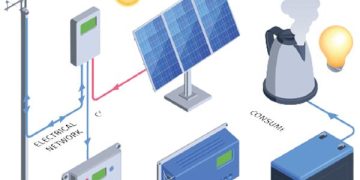In the dawn of the 21st century, as the sun’s rays pierce through the clouds of traditional energy paradigms, the solar industry stands as a beacon of innovation and sustainability. Yet, as this luminous sector grows, so too do the complexities of its workforce needs. The solar industry is not just about harnessing sunlight; it’s about harnessing human potential in an ever-evolving landscape. From the rooftops of suburban homes to sprawling solar farms in arid deserts, the demand for skilled labor is reshaping, driven by rapid technological advancements, environmental imperatives, and economic shifts. This article delves into the dynamic transformation of workforce requirements in the solar sector, exploring how businesses, educational institutions, and policymakers are responding to the call for a new generation of solar pioneers. As we illuminate the path forward, we invite you to explore the challenges and opportunities that lie in the shadows of this bright future.
Adapting to Change: The Shifting Skills Landscape in Solar Energy
The solar energy sector is undergoing a transformation that demands a fresh approach to workforce development. As technology evolves, the skills required to thrive in this industry are shifting. Gone are the days when basic installation know-how sufficed. Today, professionals must be equipped with a diverse skill set that includes not only technical expertise but also proficiency in data analysis, project management, and sustainable practices. The rise of smart grid technologies and digital platforms has further emphasized the need for IT and cybersecurity knowledge, making it imperative for workers to continuously upskill and adapt to emerging trends.
- Technical Skills: Proficiency in photovoltaic systems, electrical engineering, and system design.
- Data Analysis: Ability to interpret performance metrics and optimize energy efficiency.
- Project Management: Expertise in coordinating large-scale installations and managing resources.
- Sustainability Practices: Knowledge of eco-friendly materials and methods.
- IT and Cybersecurity: Understanding of digital infrastructures and protection of sensitive data.

Harnessing Innovation: Training the Next Generation of Solar Technicians
In an era where the solar industry is burgeoning with potential, the need to cultivate a skilled workforce has never been more critical. Training the next generation of solar technicians is paramount to meet the demands of this rapidly evolving sector. Innovative educational programs are emerging, blending traditional learning with cutting-edge technology to ensure that aspiring technicians are well-equipped for the challenges of tomorrow. By incorporating virtual reality simulations, hands-on workshops, and collaborative projects, these programs aim to provide a comprehensive learning experience that goes beyond the classroom.
- Virtual Reality Simulations: Allow students to engage with complex solar systems in a risk-free environment.
- Hands-On Workshops: Offer practical experience with solar panel installations and maintenance.
- Collaborative Projects: Foster teamwork and problem-solving skills essential for real-world applications.
As the industry continues to expand, educational institutions are recognizing the importance of adapting curricula to reflect the latest advancements in solar technology. By focusing on both technical skills and innovative thinking, these programs aim to create a workforce that is not only proficient but also adaptable to future technological shifts. The emphasis on sustainability and efficiency is shaping a new generation of solar technicians who are ready to drive the industry forward.

Building a Sustainable Future: Workforce Strategies for the Solar Sector
The rapid growth of the solar sector has ushered in a new era of opportunities and challenges, particularly in terms of workforce development. As the industry expands, there is a pressing need to cultivate a skilled and adaptable workforce capable of meeting evolving demands. This involves not only investing in technical training but also fostering a culture of continuous learning and innovation. Employers must prioritize upskilling and reskilling initiatives to ensure their teams remain at the forefront of technological advancements and industry standards.
To address these workforce needs, several strategies can be employed:
- Collaborative Partnerships: Forge alliances with educational institutions to create specialized training programs that align with industry requirements.
- Diversity and Inclusion: Encourage a diverse workforce by implementing inclusive hiring practices and offering equal opportunities for all demographics.
- Mentorship Programs: Establish mentorship initiatives that pair experienced professionals with newcomers to facilitate knowledge transfer and career development.
- Flexible Work Models: Adopt flexible work arrangements to attract talent from various backgrounds and accommodate the evolving preferences of the modern workforce.
By embracing these strategies, the solar industry can not only meet its current workforce demands but also build a sustainable foundation for future growth and innovation.

Empowering Talent: Bridging the Gap Between Education and Industry
The solar industry is rapidly evolving, demanding a workforce that is not only skilled but also adaptable to new technologies and methodologies. Educational institutions and industry leaders are collaborating more than ever to create a seamless transition for students entering the solar sector. This collaboration is vital as it ensures that the curriculum aligns with the current and future needs of the industry. Through strategic partnerships, educational programs are being tailored to include hands-on training and real-world problem-solving, preparing students to tackle the challenges of renewable energy deployment.
- Integration of cutting-edge technology: Programs now include training in the latest solar technologies, such as photovoltaic systems and energy storage solutions.
- Focus on sustainability: Emphasizing the importance of sustainable practices in energy production and consumption.
- Industry internships and placements: Providing students with practical experience through partnerships with leading solar companies.
By aligning educational pathways with industry needs, we are nurturing a generation of professionals who are ready to lead the solar revolution. This synergy not only benefits students but also empowers the solar industry to thrive and innovate.
To Wrap It Up
As we stand on the precipice of a new era in the solar industry, it becomes clear that the evolving workforce needs are not just a challenge, but an opportunity—a call to innovate, adapt, and grow. The sun, ever constant, continues to rise, casting its light on a field that promises to reshape our energy landscape. By investing in education, embracing technological advancements, and fostering an inclusive environment, we can ensure that our workforce is not only prepared for the future but is actively shaping it. As the solar industry evolves, so too must we, rising to meet the demands of a brighter tomorrow, one ray at a time. Let us harness this potential, and in doing so, illuminate the path forward for generations to come.


































